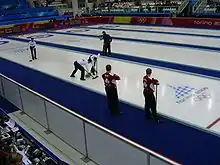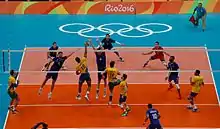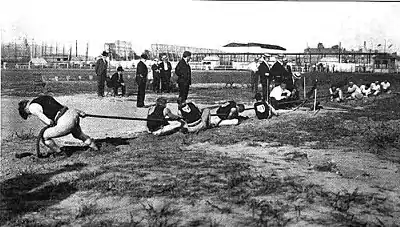Olympic sports
Olympic sports are contested in the Summer Olympic Games and Winter Olympic Games. The 2016 Summer Olympics included 28 sports, with five additional sports due to be added to the 2020 Summer Olympics program (which was postponed to at least 2021 due to the COVID-19 pandemic);[1] the 2014 Winter Olympics included seven sports.[2] The number and types of events may change slightly from one Olympiad to another. Each Olympic sport is represented by an international governing body, namely an International Federation (IF).[3] The International Olympic Committee (IOC) establishes a hierarchy of sports, disciplines, and events.[3] According to this hierarchy, each Olympic sport can be subdivided into multiple disciplines, which are often mistaken as distinct sports. Examples include swimming and water polo, which are in fact disciplines of the sport of aquatics (represented by the International Swimming Federation),[4] and figure skating and speed skating, which are both disciplines of the sport of ice skating (represented by the International Skating Union).[5] In turn, disciplines are subdivided into events, for which Olympic medals are awarded.[3] A sport or discipline is included in the Olympic program if the IOC determines it to be widely practiced around the world, that is, the popularity of a given sport or discipline is indicated by the number of countries that compete in it. The IOC's requirements also reflect participation in the Olympic Games – more stringent conditions are applied to men's sports/disciplines (as men are represented at the Games in higher numbers than women) and to summer sports/disciplines (as more nations compete in the Summer Olympics than in the Winter Olympics).
| Olympic Games |
|---|
 |
| Main topics |
| Games |

Previous Olympic Games included sports that are no longer included in the current program, such as polo and tug of war.[6] Known as "discontinued sports", these have been removed due to either a lack of interest or the absence of an appropriate governing body for the sport.[3] Some sports that were competed at the early Games and later dropped by the IOC, have managed to return to the Olympic program, for example Archery, which made a comeback in 1972, and tennis, which was reintroduced in 1988. The Olympics have often included one or more demonstration sports, normally to promote a local sport from the host country or to gauge interest in an entirely new sport.[7] Some such sports, like baseball and curling, were added to the official Olympic program (in 1992 and 1998, respectively). Baseball was discontinued after the 2008 Olympics in Beijing, only to be revived again for the forthcoming 2020 Olympics in Tokyo, which will see the introduction of new disciplines within a number of existing Summer Olympics sports as well as several new sports, such as karate and skateboarding, making their Olympic debuts.
Olympic sports definitions
The term "sport" in Olympic terminology refers to all events sanctioned by an international sport federation, a definition that may differ from the common meaning of the word "sport". One sport, by Olympic definition, may comprise several disciplines, which would often be regarded as separate sports in common usage.
For example, aquatics is a summer Olympic sport that includes six disciplines: swimming, synchronized swimming, diving, water polo, open water swimming, and high diving (the last of which is a non-Olympic discipline), since all these disciplines are governed at international level by the International Swimming Federation.[2] Skating is a winter Olympic sport represented by the International Skating Union, and includes four disciplines: figure skating, speed skating (on a traditional long track), short track speed skating, and synchronized skating (the latter is a non-Olympic discipline).[2] The sport with the largest number of Olympic disciplines is skiing, with six: alpine skiing, cross-country skiing, ski jumping, nordic combined, snowboarding, and freestyle skiing.
Other notable multi-discipline sports are gymnastics (artistic, rhythmic, and trampoline), cycling (road, track, mountain, and BMX), volleyball (indoors and beach), wrestling (freestyle and Greco-Roman), canoeing (flatwater and slalom), and bobsleigh (includes skeleton). The disciplines listed here are only those contested in the Olympics—gymnastics has two non-Olympic disciplines, while cycling and wrestling have three each.
The IOC definition of a "discipline" may differ from that used by an international federation. For example, the IOC considers artistic gymnastics a single discipline, but the International Federation of Gymnastics (FIG) classifies men's and women's artistic gymnastics as separate disciplines.[8] Similarly, the IOC considers freestyle wrestling to be a single discipline, but United World Wrestling uses "freestyle wrestling" strictly for the men's version, classifying women's freestyle wrestling as the separate discipline of "female wrestling".[9]
On some occasions, notably in the case of snowboarding, the IOC agreed to add a sport that previously had a separate international federation to the Olympics on condition that they dissolve their governing body and instead affiliate with an existing Olympic sport federation, therefore not increasing the number of Olympic sports.
An event, by IOC definition, is a competition that leads to the award of medals. Therefore, the sport of aquatics includes a total of 46 Olympic events, of which 32 are in the discipline of swimming, eight in diving, and two each in synchronized swimming, water polo, and open water swimming. The number of events per sport ranges from a minimum of two (until 2008, there were sports with only one event) to a maximum of 47 in athletics, which despite its large number of events and its diversity is not divided into disciplines except on an informal basis - the division between, for example, swimming and diving in aquatics is not replicated within athletics by divisions between track and field events, or stadium and road events.
Changes in Olympic sports

The list of Olympic sports has changed considerably during the course of Olympic history, and has gradually increased until the early 2000s, when the IOC decided to cap the number of sports in the Summer Olympics at 28.
The only summer sports that have never been absent from the Olympic program are athletics, aquatics (the discipline of swimming has been in every Olympics), cycling, fencing, and gymnastics (the discipline of artistic gymnastics has been in every Olympics).
The only winter sports that were included in all Winter Olympic Games are skiing (only nordic skiing), skating (figure skating and speed skating), and ice hockey. Figure skating and ice hockey were also included in the Summer Olympics before the Winter Olympics were introduced in 1924.
For most of the 20th century, demonstration sports were included in many Olympic Games, usually to promote a non-Olympic sport popular in the host country, or to gauge interest and support for the sport.[7] The competitions and ceremonies in these sports were identical to official Olympic sports, except that the medals were not counted in the official record. Some demonstration sports, like baseball and curling, were later added to the official Olympic program. This changed when the International Olympic Committee decided in 1989 to eliminate demonstration sports from Olympics Games after 1992.[10] An exception was made in 2008, when the Beijing Organizing Committee received permission to organize a wushu tournament.[11][12]
A sport or discipline may be included in the Olympic program if the IOC determines that it is widely practiced around the world, that is, the number of countries and continents that regularly compete in a given sport is the indicator of the sport's prevalence. The requirements for winter sports are considerably lower than for summer sports since many fewer nations compete in winter sports. The IOC also has lower requirements for inclusion of sports and disciplines for women for the same reason. Women are still barred from several disciplines; but on the other hand, there are women-only disciplines, such as rhythmic gymnastics and synchronized swimming.
Sports that depend primarily on mechanical propulsion, such as motor sports, may not be considered for recognition as Olympic sports, though there were power-boating events in the early days of the Olympics before this rule was enacted by the IOC.[3][13] Part of the story of the founding of aviation sports' international governing body, the FAI, originated from an IOC meeting in Brussels, Belgium on June 10, 1905.[14]
These criteria are only a threshold for consideration as Olympic sport. In order to be admitted to the Olympic program, the IOC Session has to approve its inclusion. There are many sports that easily make the required numbers but are not recognized as Olympic sports, mainly because the IOC has decided to put a limit on the number of sports, as well as events and athletes, in the Summer Olympics in order not to increase them from the 28 sports, 300 events, and 10,000 athletes of the 2000 Summer Olympics.
No such limits exist in the Winter Olympics and the number of events and athletes continue to increase, but no sport has been added since 1998. The latest winter sport added to the Winter Olympics was curling in 1998.
Previous Olympic Games included sports which are no longer present on the current program, like polo and tug of war.[2] In the early days of the modern Olympics, the organizers were able to decide which sports or disciplines were included on the program, until the IOC took control of the program in 1924. As a result, a number of sports were on the Olympic program for relatively brief periods before 1924.[3] These sports, known as discontinued sports, were removed because of lack of interest or absence of an appropriate governing body, or because they became fully professional at the time that the Olympic Games were strictly for amateurs, as in the case of tennis.[3] Several discontinued sports, such as archery and tennis, were later readmitted to the Olympic program (in 1972 and 1984, respectively). Curling, which was an official sport in 1924 and then discontinued, was reinstated as Olympic sport in 1998.
The Olympic Charter decrees that Olympic sports for each edition of the Olympic Games should be decided at an IOC Session no later than seven years prior to the Games.
Changes since 2000
The only sports that have been dropped from the Olympics since 1936 are baseball and softball, which were both voted out by the IOC Session in Singapore on July 11, 2005,[15] a decision that was reaffirmed on February 9, 2006,[16] and reversed on August 3, 2016.[17] These sports were last included in 2008, although officially they remain recognized in the Olympic Charter as a single sport, since both are now governed internationally by the World Baseball Softball Confederation. Therefore, the number of sports in the 2012 Summer Olympics was dropped from 28 to 26.
Following the addition of women's boxing in 2012, and women's ski jumping in 2014, there are only Greco-Roman wrestling and nordic combined, respectively, that are only for men in those games.
Two previously discontinued sports, golf and rugby, returned for the 2016 Summer Olympics. On August 13, 2009, the IOC Executive Board proposed that golf and rugby sevens be added to the Olympic program for the 2016 Games.[18] On 9 October 2009, during the 121st IOC Session in Copenhagen, the IOC voted to admit both sports as official Olympic sports and to include them in the 2016 Summer Olympics.[19] The IOC voted 81–8 in favor of including rugby sevens and 63–27 in favor of reinstating golf, thus bringing the number of sports back to 28.[19]
In February 2013, the IOC considered dropping a sport from the 2020 Summer Olympics to make way for a new sport. Modern pentathlon and taekwondo were thought to be vulnerable, but instead the IOC recommended dismissing wrestling.[20] On September 8, 2013, the IOC added wrestling to the 2020 and 2024 Summer Games.[21]
On August 3, 2016, the IOC voted to add baseball/softball, karate, sport climbing, surfing, and skateboarding for the 2020 Summer Olympics.[17]
Summer Olympics

At the first Olympic Games, nine sports were contested.[22] Since then, the number of sports contested at the Summer Olympic Games has gradually risen to twenty-eight on the program for 2000–2008. At the 2012 Summer Olympics, however, the number of sports fell back to twenty-six following an IOC decision in 2005 to remove baseball and softball from the Olympic program. These sports retain their status as Olympic sports with the possibility of a return to the Olympic program in future games.[15] At the 121st IOC Session in Copenhagen on 9 October 2009, the IOC voted to reinstate both golf and rugby to the Olympic program, meaning that the number of sports to be contested in 2016 was once again 28.[23]
In order for a sport or discipline to be considered for inclusion in the list of Summer Olympics sports, it must be widely practiced in at least 75 countries, spread over four continents.
Current and discontinued summer program
The following sports (or disciplines of a sport) make up the current and discontinued Summer Olympic Games official program and are listed alphabetically according to the name used by the IOC. The discontinued sports were previously part of the Summer Olympic Games program as official sports, but are no longer on the current program. The figures in each cell indicate the number of events for each sport contested at the respective Games; a bullet (•) denotes that the sport was contested as a demonstration sport.
Eight of the 34 sports consist of multiple disciplines. Disciplines from the same sport are grouped under the same color:
Aquatics – Basketball – Canoeing/Kayaking – Cycling – Gymnastics – Volleyball – Equestrian – Wrestling
- The World Baseball Softball Confederation, which currently governs both baseball and softball, was created by a 2013 merger of two former governing bodies—the International Baseball Federation and the International Softball Federation, thus at the Olympic games until 2012 baseball and softball were presented as two different sports.
- At the time skateboarding was announced as part of the 2020 Summer Games, the sport was governed by the International Skateboarding Federation. That body merged with Fédération Internationale de Roller Sports in September 2017 to form the current World Skate.
Demonstration summer sports
The following sports or disciplines have been demonstrated at the Summer Olympic Games for the years shown, but have never been included on the official Olympic program:
 American football (1932)
American football (1932) Australian football (1956)
Australian football (1956) Ballooning (1900)
Ballooning (1900) Tenpin Bowling (1988)
Tenpin Bowling (1988) Boules (1900)
Boules (1900)

 Budō (1964)
Budō (1964) Pesäpallo (1952)
Pesäpallo (1952) Gaelic football (1904)
Gaelic football (1904) Glima (1912)
Glima (1912) Gliding (1936)
Gliding (1936) Hurling (1904)
Hurling (1904) Kaatsen (1928)
Kaatsen (1928) Korfball (1920 and 1928)
Korfball (1920 and 1928) La canne (1924)
La canne (1924) Surf lifesaving (1900)
Surf lifesaving (1900) Longue paume (1900)
Longue paume (1900)_pictogram.svg.png.webp)
_pictogram.svg.png.webp)
_pictogram.svg.png.webp) Motorsport (1900)
Motorsport (1900) Roller hockey (1992)
Roller hockey (1992) Savate (1924)
Savate (1924)_pictogram.svg.png.webp) Swedish (Ling) gymnastics (1948)
Swedish (Ling) gymnastics (1948) Weight training with dumbbells (1904)
Weight training with dumbbells (1904) Water skiing (1972)
Water skiing (1972)
Gliding was promoted from demonstration sport to an official Olympic sport in 1936 in time for the 1940 Summer Olympics, but the Games were cancelled due to the outbreak of World War II.[24][25]
Tenpin bowling, demonstrated separately from the Olympics in 1936 in Germany (alongside forms of ninepin bowling), but part of the demonstration sports at Seoul in 1988, has been a regular medal sport of the World Games since 1981 and the Pan American Games since 1991.
Classification of Olympic sports for revenue share
Summer Olympic sports are divided into categories based on popularity, gauged by: television viewing figures (40%), Internet popularity (20%), public surveys (15%), ticket requests (10%), press coverage (10%), and number of national federations (5%). The category determines the share the sport's International Federation receives of Olympic revenue.[26][27]
The current categories, as of 2013, are as follows, with the pre-2013 categorizations also being available.[28] Category A represents the most popular sports; category E lists either the sports that are the least popular or that are new to the Olympics (golf and rugby).
| Category | Individual Sport | Team Sport |
|---|---|---|
| A | athletics, aquatics, gymnastics | —— |
| B | cycling, tennis | basketball, football, volleyball |
| C | archery, badminton, boxing, judo, rowing shooting, table tennis, weightlifting | —— |
| D | canoe/kayaking, equestrian, fencing, sailing, taekwondo, triathlon, wrestling | handball, field hockey |
| E | modern pentathlon, golf | rugby |
Winter Olympics

Before 1924, when the first Winter Olympic Games were celebrated, sports held on ice, like figure skating and ice hockey, were held at the Summer Olympics.[29] These two sports made their debuts at the 1908 and the 1920 Summer Olympics, respectively, but were permanently integrated in the Winter Olympics program as of the first edition. The International Winter Sports Week, later dubbed the I Olympic Winter Games and retroactively recognized as such by the IOC, consisted of nine sports. The number of sports contested at the Winter Olympics has since been decreased to seven, comprising a total of fifteen disciplines.[30]
A sport or discipline must be widely practiced in at least 25 countries on three continents in order to be included on the Winter Olympics program.[3]
Current winter program
The following sports (or disciplines of a sport) make up the current Winter Olympic Games official program and are listed alphabetically, according to the name used by the IOC. The figures in each cell indicate the number of events for each sport that were contested at the respective Games (the red cells indicate that those sports were held at the Summer Games); a bullet (•) denotes that the sport was contested as a demonstration sport. On some occasions, both official medal events and demonstration events were contested in the same sport at the same Games.
Three out of the seven sports consist of multiple disciplines. Disciplines from the same sport are grouped under the same color:
| Sport (Discipline) | Body | 08 | 20 | 24 | 28 | 32 | 36 | 48 | 52 | 56 | 60 | 64 | 68 | 72 | 76 | 80 | 84 | 88 | 92 | 94 | 98 | 02 | 06 | 10 | 14 | 18 | ||||||
|---|---|---|---|---|---|---|---|---|---|---|---|---|---|---|---|---|---|---|---|---|---|---|---|---|---|---|---|---|---|---|---|---|
| Figure skating | ISU | 4 | 3 | 3 | 3 | 3 | 3 | 3 | 3 | 3 | 3 | 3 | 3 | 3 | 4 | 4 | 4 | 4 | 4 | 4 | 4 | 4 | 4 | 4 | 5 | 5 | ||||||
| Speed skating | 5 | 4 | 4 | 4 | 4 | 4 | 4 | 8 | 8 | 8 | 8 | 9 | 9 | 9 | 10 | 10 | 10 | 10 | 10 | 12 | 12 | 12 | 14 | |||||||||
| Short track speed skating | • | 4 | 6 | 6 | 8 | 8 | 8 | 8 | 8 | |||||||||||||||||||||||
| Ice hockey | IIHF | 1 | 1 | 1 | 1 | 1 | 1 | 1 | 1 | 1 | 1 | 1 | 1 | 1 | 1 | 1 | 1 | 1 | 1 | 2 | 2 | 2 | 2 | 2 | 2 | |||||||
| Curling | WCF | 1 | • | • | • | 2 | 2 | 2 | 2 | 2 | 3 | |||||||||||||||||||||
| Cross-country skiing | FIS | 2 | 2 | 2 | 3 | 3 | 4 | 6 | 6 | 7 | 7 | 7 | 7 | 7 | 8 | 8 | 10 | 10 | 10 | 12 | 12 | 12 | 12 | 12 | ||||||||
| Alpine skiing | 2 | 6 | 6 | 6 | 6 | 6 | 6 | 6 | 6 | 6 | 6 | 10 | 10 | 10 | 10 | 10 | 10 | 10 | 10 | 11 | ||||||||||||
| Ski jumping | 1 | 1 | 1 | 1 | 1 | 1 | 1 | 1 | 2 | 2 | 2 | 2 | 2 | 2 | 3 | 3 | 3 | 3 | 3 | 3 | 3 | 4 | 4 | |||||||||
| Nordic combined | 1 | 1 | 1 | 1 | 1 | 1 | 1 | 1 | 1 | 1 | 1 | 1 | 1 | 1 | 2 | 2 | 2 | 2 | 3 | 3 | 3 | 3 | 3 | |||||||||
| Freestyle skiing | • | 2 | 4 | 4 | 4 | 4 | 6 | 10 | 10 | |||||||||||||||||||||||
| Snowboarding | 4 | 4 | 6 | 6 | 10 | 10 | ||||||||||||||||||||||||||
| Biathlon | IBU | 1 | 1 | 2 | 2 | 2 | 3 | 3 | 3 | 6 | 6 | 6 | 8 | 10 | 10 | 11 | 11 | |||||||||||||||
| Luge | FIL | 3 | 3 | 3 | 3 | 3 | 3 | 3 | 3 | 3 | 3 | 3 | 3 | 3 | 4 | 4 | ||||||||||||||||
| Bobsleigh | IBSF | 1 | 1 | 2 | 2 | 2 | 2 | 2 | 2 | 2 | 2 | 2 | 2 | 2 | 2 | 2 | 2 | 2 | 3 | 3 | 3 | 3 | 3 | |||||||||
| Skeleton | 1 | 1 | 2 | 2 | 2 | 2 | 2 | |||||||||||||||||||||||||
| Discontinued winter sports | ||||||||||||||||||||||||||||||||
| Biathlon / Military Patrol | IBU | 1 | • | • | • | |||||||||||||||||||||||||||
| Total events | 16 | 14 | 14 | 17 | 22 | 22 | 24 | 27 | 34 | 35 | 35 | 37 | 38 | 39 | 46 | 57 | 61 | 68 | 78 | 84 | 86 | 98 | 102 | |||||||||
| Total Sports | 9 | 8 | 7 | 8 | 9 | 8 | 8 | 8 | 10 | 10 | 10 | 10 | 10 | 10 | 10 | 12 | 12 | 14 | 15 | 15 | 15 | 15 | 15 | |||||||||
The official website of the Olympic Movement designates men's military patrol at the 1924 Games as an event within the sport of biathlon.[31][32] The Official Report of the 1924 Games regards it as an event within the sport of skiing.[33][34]
Demonstration winter sports
The following sports have been demonstrated at the Winter Olympic Games for the years shown, but have never been included on the official Olympic program:
 Bandy (1952)
Bandy (1952) Disabled skiing (1984 and 1988)
Disabled skiing (1984 and 1988) Ice stock sport (1936, 1964)
Ice stock sport (1936, 1964) Ski ballet (acroski) (1988 and 1992)
Ski ballet (acroski) (1988 and 1992) Skijoring (1928)
Skijoring (1928) Sled-dog racing (1932)
Sled-dog racing (1932) Speed skiing (1992)
Speed skiing (1992)_pictogram.svg.png.webp) Winter pentathlon (1948)
Winter pentathlon (1948)
Ice climbing was showcased at the Sochi Winter Olympics in 2014, was on the non-competition program at the 2016 Winter Youth Olympic Games, and aims to become an official competition sport.[35] Ski ballet was a demonstration event under the scope of freestyle skiing. Disabled sports are now part of the Winter Paralympic Games.
Recognized international federations

Many sports are not recognized as Olympic sports although their governing bodies are recognized by the IOC.[36] Such sports, if eligible under the terms of the Olympic Charter, may apply for inclusion in the program of future Games, through a recommendation by the IOC Olympic Programme Commission, followed by a decision of the IOC Executive Board and a vote of the IOC Session. When Olympic demonstration sports were allowed, a sport usually appeared as such before being officially admitted.[7] An International Sport Federation (IF) is responsible for ensuring that the sport's activities follow the Olympic Charter. When a sport is recognized the IF become an official Olympic sport federation and can assemble with other Olympic IFs in the Association of Summer Olympic International Federations (ASOIF, for summer sports contested in the Olympic Games), Association of International Olympic Winter Sports Federations (AIOWS, for winter sports contested in the Olympic Games) or Association of IOC Recognised International Sports Federations (ARISF, for sports not contested in the Olympic Games).[2] A number of recognized sports are included in the program of the World Games, a multi-sport event run by the International World Games Association, an organization that operates under the patronage of the IOC. Since the start of the World Games in 1981, a number of sports, including badminton, taekwondo, and triathlon have subsequently been incorporated into the Olympic program.
In 2020, the IOC altered the way it plans the Olympic Games from one based around a maximum number of sports, to taking total events into account, opening the schedule up for the inclusion on a Games by Games basis of additional sports to the 25 "core" sports. For the 2020 Summer Olympics, the local organizing committee was thus permitted to add a total of five sports to the programme in addition to the existing 28, taking the total to 33.[17][37]
The governing bodies of the following sports, though not contested in the Olympic Games, are recognized by the IOC:[38]
 Air sports1,3
Air sports1,3 American football[39]
American football[39] Auto racing3
Auto racing3 Bandy
Bandy Baseball and Softball1,2,4,5
Baseball and Softball1,2,4,5 Billiard sports1
Billiard sports1 Boules1
Boules1 Bowling1
Bowling1 Bridge
Bridge Cheerleading
Cheerleading Chess
Chess Cricket2
Cricket2 Dancesport1
Dancesport1 Floorball1
Floorball1 Ice stock sport
Ice stock sport Karate1,5
Karate1,5 Kickboxing1
Kickboxing1 Korfball1
Korfball1 Lacrosse1
Lacrosse1 Lifesaving1
Lifesaving1 Motorcycle racing3
Motorcycle racing3.svg.png.webp) Mountaineering and Climbing
Mountaineering and Climbing Muay Thai1
Muay Thai1 Netball
Netball Orienteering1
Orienteering1 Pelota Vasca
Pelota Vasca Polo2
Polo2_pictogram.svg.png.webp) Powerboating3
Powerboating3 Racquetball1
Racquetball1 Roller sports1, 6
Roller sports1, 6 Sambo
Sambo Ski mountaineering
Ski mountaineering Sport climbing1, 5
Sport climbing1, 5 Squash1
Squash1 Sumo1
Sumo1 Surfing5
Surfing5 Tug of war1,2
Tug of war1,2 Underwater sports1
Underwater sports1 Ultimate (Flying disc)1 [40]
Ultimate (Flying disc)1 [40] Water skiing1, 3
Water skiing1, 3 Wushu
Wushu
1 Official sport at the World Games
2 Discontinued Olympic sport
3 Ineligible to be included because the Olympic Charter bans sports with motorization elements
4 The governing bodies for baseball and softball merged into a single international federation in 2013.
5 Included at the 2020 Summer Olympics
6 Skateboarding, now a discipline within roller sports, is Included at the 2020 Summer Olympics.
See also
References
- "Joint Statement from the International Olympic Committee and the Tokyo 2020 Organising Committee". International Olympic Committee. Retrieved 24 March 2020.
- "Olympic Sports". International Olympic Committee. Retrieved 2010-03-13.
- "Olympic Sports, Disciplines & Events". HickokSports.com. 2005-02-04. Archived from the original on 2007-04-18. Retrieved 2007-03-18.
- "Aquatics". Sports. International Olympic Committee. Retrieved 2007-04-06.
- "Skating". Sports. International Olympic Committee. Retrieved 2007-04-06.
- "Olympic sports of the past". Sports. International Olympic Committee. Retrieved 2007-04-06.
- "Demonstration Sports at the Olympic Games". Top End Sports. 2007-01-26. Retrieved 2007-03-18.
- "Disciplines". International Federation of Gymnastics. Retrieved 3 October 2015. Clicking on the "Disciplines" tab in the main menu bar brings up a list of FIG disciplines; men's and women's artistic gymnastics are listed separately.
- "Disciplines". United World Wrestling. Retrieved 31 October 2014.
- "Albertville 1992". International Olympic Committee. Retrieved 2008-07-08.
- "Wushu to be part of Beijing Olympic Games". News Guangdong. 2005-10-14. Retrieved 2007-03-18.
- "Rogge says wushu no "Olympic sport" in 2008". Xinhua News Agency. 2005-10-16. Archived from the original on 2006-11-28. Retrieved 2007-03-18.
- What Events are Olympic? Olympics at SportsReference.com. Accessed on 15 Aug 2008.
- "The Postal History of ICAO". Icao.int. Retrieved 2014-02-09.
- "They'rrre out! Olympics drop baseball, softball". NBC Sports. Associated Press. 9 July 2005. Archived from the original on 12 August 2008. Retrieved 15 August 2008.
Rogge has basically conspired against the sports to get them removed
- de Vries, Lloyd (9 February 2006). "Strike 3 for Olympic Baseball". CBS News. Retrieved 15 August 2008.
- "IOC approves five new sports for Olympic Games Tokyo 2020". Olympic.org. 2016-08-03. Retrieved 2016-08-03.
- Wilson, Stephen (August 13, 2009). "Golf, rugby backed by IOC board for 2016 Games". The Seattle Times. Associated Press. Retrieved 2009-08-14.
- "Golf & rugby voted into Olympics". BBC. October 9, 2009. Retrieved 4 January 2010.
- "Wrestling to be dropped from 2020 Olympic Games", BBC Sport, 12 February 2013.
- "Wrestling added to Olympic programme for 2020 and 2024 Games". Retrieved 8 September 2013.
- "Athens 1896". Olympic Games. International Olympic Committee. Retrieved 2010-03-13.
- Klein, Jeff Z. (August 14, 2009). "IOC Decision Draws Cheers and Complaints From Athletes". New York Times.
- Welch, Ann (1980). The Story of Gliding 2nd edition. John Murray. ISBN 0-7195-3659-6.
- "DFS-Olympia-Meise". Deutsches Museum. Retrieved 2008-03-25.
- "Athletics to share limelight as one of top Olympic sports". The Queensland Times. 2013-05-31. Retrieved 2013-07-18.
- "Winners Include Gymnastics, Swimming - and Wrestling - as IOC Announces New Funding Distribution Groupings". The Association of Summer Olympic International Federations. Retrieved 2013-07-18.
- Editorial, Reuters. "Olympics-IOC sports revenue rankings". reuters.com. Retrieved 28 October 2018.
- "A History of Winter Olympic Games: Celebration and Contrariety". WorldWeb Travel Guide. 2000. Retrieved 2008-08-01.
- "Chamonix 1924". Olympic Games. International Olympic Committee. Retrieved 2010-03-13.
- "Biathlon Results - Chamonix 1924". International Olympic Committee. Retrieved 17 February 2014.
- "Olympic Games Medals, Chamonix 1924". International Olympic Committee. Retrieved 17 February 2014.
- Official Report (1924), p 646: Le Programme ... II. — Epreuves par équipes - 12. Ski : Course militaire (20 à 30 kilomètres, avec tir). (The Programme ... II. — Team events - 12. Skiing : Military Race (20 to 30 kilometres, with shooting)).
- Official Report (1924), p 664: CONCOURS DE SKI - Jurys - COURSE MILITAIRE. (Skiing Competitions - Juries - Military Race)
- "The UIAA and its Olympic Goal". Union Internationale des Associations d'Alpinisme. Archived from the original on 25 February 2018. Retrieved 4 April 2017.
- www.immagica.it, Immagica -. "ARISF Association of IOC Recognised International Sport Federation". www.arisf.org. Retrieved 28 October 2018.
- "You're in! Baseball/softball, 4 other sports make Tokyo cut". USA Today. 2016-08-03. Retrieved 2016-08-18.
- "International Sports Federations (IFs)". Olympic.org. Retrieved 2014-07-07.
- "IFAF Earns Recognition by the International Olympic Committee". IFAF.org. Retrieved 2014-02-20.
- "Get Horizontal | Ultimate & WFDF Receive Recognition By IOC !!!!". Gethorizontal.be. 2013-01-24. Archived from the original on 2013-06-13. Retrieved 2014-02-09.
External links
| Wikimedia Commons has media related to Olympic sports. |